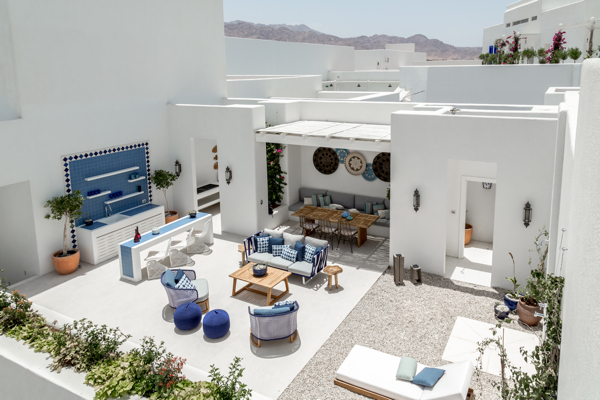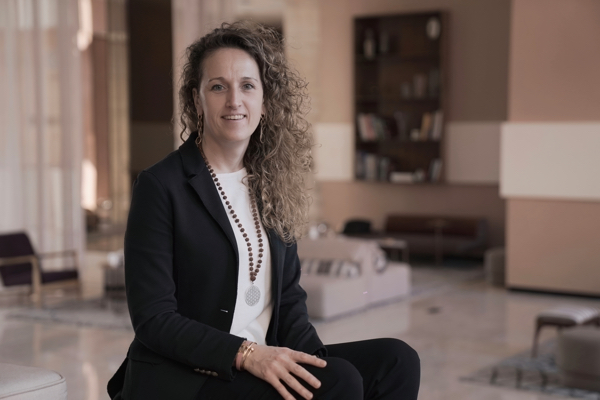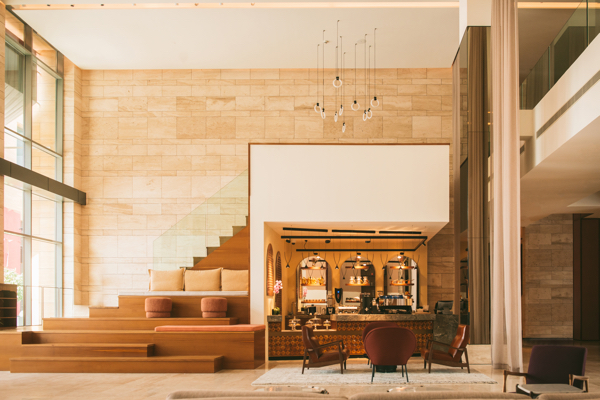What a year it has been so far for Kerten Hospitality, gathering momentum as a luxury and lifestyle hospitality company with just two hotels open and a very forward-looking view of what a hospitality company should look and act like to set itself apart and appeal to next-gen travelers. With great timing and a lot of fortitude, it is executing on multiple deals, opening more properties and proving bottom line performance that for tireless CEO Marloes Knippenberg should lead to even more opportunities.
Dublin, Ireland-based, but with more initial developments in the Middle East, Kerten Hospitality creates sustainable, high-end, mixed-use spaces – big or small, new or converted – with a mix of more traditional short-term hotel products, residences and a hybrid coworking component (never a classic meeting floor that has low occupancy and just sits there as an add on product) to help extend seasonality in sometimes seasonal markets.
In full, Kerten has 11 brands, ranging from hotels and residences to stand-alone food and beverage spaces, coworking concepts, as well as retail, entertainment, art and wellness brands. The mix is part of the overall focus to build ecosystems and unique community-centric destinations that connect travelers with locals.

With only two properties open through April (The House Hotel Jeddah City Yard and Cloud 7 hotel and hub in Aqaba, Jordan) and five more expected to come online in 2022, the company’s pipeline has skyrocketed to 40 projects across its brands and Knippenberg expects it to eclipse 50 before the end of the year. The House Hotel Jeddah City Yard, for example, is the Kingdom’s first true community-centric destination to stay, dine and socialize. Having already hosted some big local and international names, the project has gone to the market in an organic way to build a long-term and sustainable business.
More recent deals range from an eco-luxury resort in the United Arab Emirates, an art hotel and residences in Georgia curated by the Louvre Abu Dhabi, and a conversion to a Cloud 7 near the Spanish Steps in Rome, Italy, to an eco-resort in Abha, Saudi Arabia. An owner in Egypt is developing 2,500 keys with Kerten and there are further projects in Saudi Arabia, Europe, the Middle East and North Africa.
Every project places a big emphasis on embedding Kerten’s inclusive philosophies and an increasingly process-driven approach to an ESG-focused platform emphasizing sustainability, promoting women in hospitality, and supporting the new entrepreneurial generation in its markets.
Additionally, Kerten co-chairs the Sustainable Hospitality Challenge – a global innovation challenge that involves 30 top tier hospitality schools whose 2021 winners are now finalizing the implementation of their innovative coliving concept. Kerten also recently signed a partnership with Effat University in Jeddah to support entrepreneurship, innovation, and human capital upskilling. “We’re bringing in ESG and the soft side of the business from the initial stages of a project,” Knippenberg emphasized.

That soft side includes training and hiring more locals, creating in-house experiential programming for the locals instead of hotel guests, and offering multiple stay options to meet travelers evolving needs.
Kerten hotel-related brands include Cloud 7 Hotels, Cloud 7 Residence, The House Hotel, The House Residence and Ouspace, a social hub and serviced-office concept. Kerten also has in-house F&B team known for collaborating with Michelin-starred chefs and local restaurateurs.
Hotel F&B decisions are also driven by location, sometimes utilizing neighborhood shops and other times self-operating or bringing in local talent to operate within Kerten projects. In fact, Kerten is launching a digital platform that allows guest to tap into the local neighborhoods to find hot spots for dining and entertainment.
To date, about half of the pipeline sits under the premium, experiential House Hotel brand and the other half sits under Cloud 7, which is the younger-styled brand that does much more to maximize space. All projects have the Ouspace component to ensure a working space for guests and locals. The range of F&B brands runs from gelato shops to a Mediterranean sharing concept. Kerten can run everything with or without alcohol, depending on which part of the world it is opening.
Kerten teams are located all the way from Dublin, through Spain, Vienna, Dubai, Riyadh and Jeddah, and working remote and on projects has always been the group’s remit.
Dutch-born Knippenberg, who spent 10 years on the commercial side with Hilton, said the pandemic has accelerated acceptance of Kerten concepts because developer’s views are evolving more quickly, more readily accepting of a hub-like concept with multiple facets. “People came back to us saying, ‘can you tell us one more time what you believe it is people want to do and how we can really look at our assets? Then create something that brings in ROI for the long term and not just for a couple of years.’”
Couple this forward-thinking approach with accelerated signings and the group is gaining more notoriety than many brands across the globe.
If recognition and opportunity weren’t enough motivation, Kerten’s revenue center in Poland, not far from what has been a battlefield in Ukraine, has served to further bring the team together. “We really came together as a team to support the center and its people, and that really motivated the team to progress together and grow from there,” Knippenberg said. “At the moment, the other most important pieces include finalizing more of our processes and bringing on the next projects.” Those processes for the young company are being led by recently appointed COO Wafik Youssef.
With the most recent opening scheduled for May, The House Hotel in Tbilisi, Knippenberg said the focus is on “opening, opening, opening, and signing, signing, signing.”
Being able to prove performance [40% GOP in Aqaba] has been a real game-changer, taking the idea beyond concept to reality, she said. “The bottom line looks very good,” she added. “We can do this on more projects and really bring this whole story to life.”
The Kerten process
But growing from two hotels open to a pipeline of close to 50 properties, including some stand-alone F&B developments, can sound rather daunting to an emerging player. Knippenberg’s response: no sleep and, again, process.
The team builds a story for every project and focuses intently on the relationship with the owners, gathering intelligence about what will work best for the project and sharing it with the team. “Every project has a different champion. So, it doesn’t matter what your role is in the organization,” Knippenberg said. “And the champion is not the person who brings it to life but is really the one who coordinates it. Then, it really follows with ESG, product, and then neighborhood, and goes from there. Now that we are better able to do this and follow it systematically, I have probably felt more Zen than ever because I can see how we can grow this out with the way that we’ve built it up.”

That said, with issues surrounding supply chain, inflation, rising interest rates, how does the Kerten team maintain that level of “Zen?”
Knippenberg said because Kerten lives an ESG-first approach to development, tied to the community, it doesn’t have as many international or exclusive FF&E agreements, which could potentially face delays and multiple price hikes. And even though interest rates are going up, she said there is a lot of capital available that has been sitting on the side during COVID. In fact, some competing projects that no longer pencil-out due to COVID-related challenges are creating new opportunities for Kerten. “People are sitting on money and want to spend it,” Knippenberg added. “They see the opportunities and want to do transactions… There’s always a down, there’s always an up – it just depends on from which pond you’re fishing.”
What also seems to set Kerten apart is its philosophy about distribution. Yes, it has its own booking engine and Knippenberg said they are successfully converting new customers to direct bookers because of relationships built on property, but Kerten also embraces OTAs. “I think booking.com and Expedia are driving so much business, and even people in the industry who complain about it still book their trips via booking.com because it’s so much easier,” she said. “There’s a lot you can do with those channels, instead of trying to reinvent the new generation of loyalty… You don’t hear a lot of the younger generation saying, ‘Oh, look at my points and I’m only going to stay there because I get those points.’ Now, they’re asking, ‘What is this company doing? Who are they and do I want to be associated to this? What is the community who stayed there? Let me check online. Let me check the pictures. It’s a very different philosophy.”
In response to endless conversations and concerns about high OTA commissions, Knippenberg insisted it is something that can be negotiated and suggests that building direct business is not cheap. “Would I set up a loyalty scheme or anything like that? Definitely not,” she said. “I’d rather partner with people that really have something to bring… Consumer are interested in staying at different projects, and if you nurture relationships from the beginning, that’s something you can scale with. You build that into the whole philosophy of the company and the way you do business. The moment that your head office is a service center, you have a really different business going on.”
Butterfly effect
Continually questioning industry norms is typical for the Kerten team and the biggest emphasis is on ESG-focused programming and the advancement of women in hospitality. “We’re going by the butterfly effect. So, even small actions can eventually have a massive global impact,” Knippenberg said.
The connection to community helps push the story further, as well. For example, when it comes to sustainability initiatives, Kerten prefers to look for direction by understanding the focus of local governments, where shortages lie, and the availability of local materials. “Once you set the rule, it’s so much easier to doing it locally rather than trying to set an overall company global rule because every part of the world is so different. Local requests and the requirements are so different,” Knippenberg explained.

To further opportunities for women, it helps that Kerten Hospitality team is 70% women and that its leader is a woman. Nonetheless, Knippenberg said more initiatives and even some pushing is required because not enough organizations are following through on their proposals. “I’m not sure our generation will necessarily change that so much,” she added. “But I think we have a responsibility to leave something behind that’s responsible and cared for – that we did our utmost to support.”
The other hot topic on Knippenberg’s mind, even as she hesitates, is the metaverse and NFTs. Warily, she knows it’s a conversation that must be had. “A company our size could never have grown as much if we didn’t have a platform to share and communicate,” Knippenberg said. “I think this is something that we will try to embrace without going crazy. We’re not building in the metaverse at the moment, but we’re definitely taking a close look at it. And it will be great for a company like ours to further collaborate with tech companies, retail companies who really are a bit more progressive.”
Collaboration and looking outside of the hospitality industry for ideas is vitally important to success, according to Knippenberg. “The industry has been talking about this for so long, but there is such slow integration,” she said. “We’re one of the only sectors that is still within its own box and frame instead of really looking out there. The world is changing so fast that we have a responsibility to owners to change with it, so their assets actually remain profitable and remain relevant for the future.”
This is the kind of thinking that seems to drive often impatient Knippenberg and Kerten Hospitality. “I love the journey and what we’re developing, but I question it every day,” she said. We’re working so hard every day to progress and question how we can become better, collaborate better with owners… I sometimes wish we had more hours in the day to do more collaborations because we meet such incredible people… I’m really thankful for this journey and, yes, it’s a work in progress every single day.”

